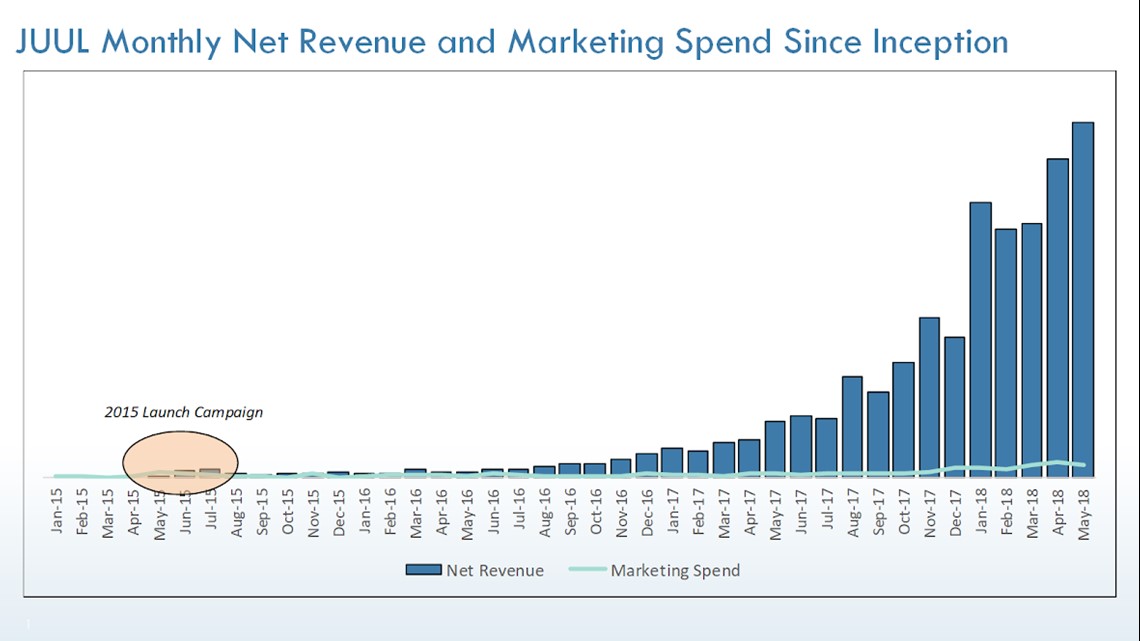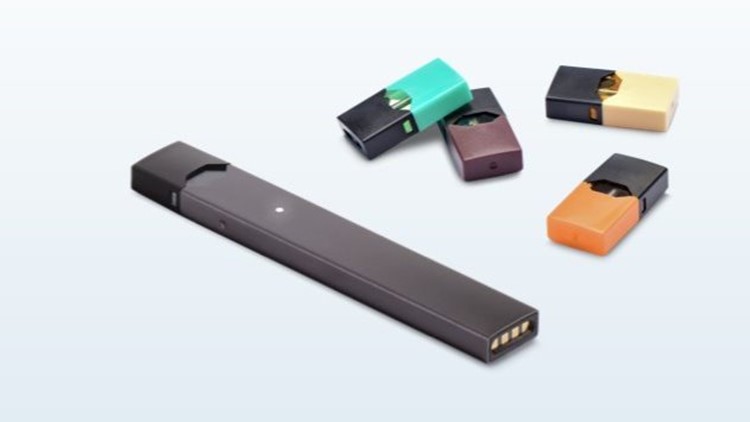RALEIGH, N.C. — E-cigarettes are the number one tobacco nicotine product being used by youth in the Tar Heel State, and twice as many kids use e-cigarettes than they do cigarettes.
That's according to the state health director and chief medical officer of North Carolina, and that's why Attorney General Josh Stein recently zeroed in on JUUL, a company which has about 75 percent of all e-cigarette revenue.
Now a meeting is in the works between Stein and JUUL after the attorney general launched an investigation into the company’s marketing practices earlier this month.
On October 15, Stein said he requested information from JUUL about its advertising, specifically toward young people, and the number of people using the device in North Carolina.
“JUUL dominates the market. I am extremely concerned about the way JUUL has marketed its product to young people, who face increased risk for addiction and exposure to health problems,” Stein said in a news release.
At a news conference, Dr. Martha Perry with UNC Children's Hospital echoed Stein’s sentiments about the dangers of teens using e-cigarettes.
“The developing adolescent brain is more vulnerable to addiction,” said Dr. Perry. “In using this device this early, you’re priming the addiction centers for a lifetime of nicotine addiction and other potential substances.”
Dr. Betsey Tilson, state health director and chief medical officer, explained there has been great success over the past 20 years in the decrease of smoking among youth in North Carolina. Then e-cigarettes came along in 2011.
“Now 17 percent of high school students report use, which is more than the national average of 12 percent." Dr. Tilson said.
JUUL on the defense
The same day Stein announced his investigation, JUUL responded, saying the company does not target young people in its advertising campaigns.
"Our priority is the same as Attorney General Stein’s -- to keep nicotine products out of the hands of young people,” said Kevin Burns, JUUL Labs Chief Executive Officer (CEO), in an email.
The company said its advertising during the time frame Stein spoke of didn’t reflect any kind of spike in revenue.
"The advertising mentioned was in 2015, short-lived, intended for adults and had very little impact on our growth per the below chart,” a statement from JUUL Labs said. “Our current marketing features former adult smokers who have switched to JUUL, and we also launched an educational campaign for parents.”


In another email, JUUL went on to list several ways the company is trying to keep teens from using its product.
- Restricting purchase through the website to ages 21 and up
- Supporting ages 21 and up as a national standard
- Modifying website and social media to focus on adults
- Removing all product-related content from social media accounts
- Not using Snapchat, a popular social media platform for teens
- Working with other social media platforms to remove posts that show the product in a youth-oriented manner
- Working with eBay, Amazon, and Walmart to remove the product from online marketplaces if there’s no age verification process
- Modifying packaging to including nicotine warning
- Simplifying names of flavors
JUUL said it also has a secret shopper program to make sure retailers are not selling the device to minors.
“This program has already visited more than 2,000 retailers. We estimate that by year’s end, we will visit 4,500 retailers total,” Ted Kwong, JUUL senior communications manager, said in an email.
Stein doubles down
In a phone interview, North Carolina's attorney general said the investigation is not necessarily about what JUUL is doing now, it’s what JUUL did in the past.
“The fundamental question is, has JUUL engaged in activities to encourage young people to start vaping?” said Stein. “It’s not enough to look at what they’re doing today; they need to undo the damage that’s already been done.”
The Centers for Disease Control (CDC) said some e-cigarette marketing can be compared to traditional cigarette marketing before the Master Settlement Agreement (MSA) in 1998, where restrictions were placed on tobacco advertising such as using cartoon characters and offering gifts in exchange for proofs of purchase.
“In 2016, the Surgeon General’s Report on e-cigarette use among youth and young adults concluded that e-cigarette marketing employs strategies similar to conventional cigarette advertising tactics that have been proven to appeal to youths, such as themes of romance, freedom, and rebellion; celebrity endorsements; and health claims,” Joel London, senior press officer with the CDC Office of Smoking and Health, said in an email.
Still, JUUL maintains minors, former smokers, and non-smokers should not use the device and calls it a “switching product” for current, adult smokers.
“Underage use of JUUL and any other vaping products is completely unacceptable to us and is directly opposed to our mission of eliminating cigarettes by offering existing adult smokers a true alternative to combustible cigarettes,” said Burns.
A section on JUUL’s website called “Our Responsibility” outlines the company’s views on regulation and public policy as well as marketing and social media code. At the bottom, links are listed to organizations like Tobacco-Free Kids, The Food and Drug Administration (FDA), and the Truth Initiative, a nonprofit that specifically aims to keep youth from using tobacco.
“We stand committed to working with those who want to keep nicotine products out of the hands of young people,” Burns said.




